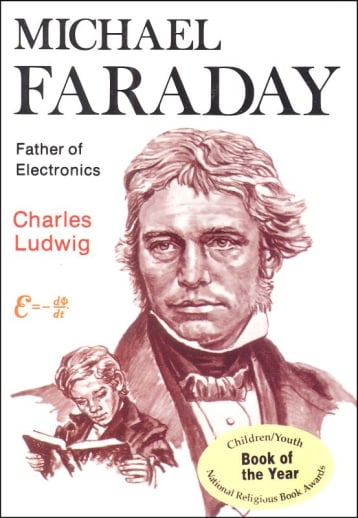Michael Faraday, inventor of the electric motor, transformer, and generator - who is now considered today the father of electronics - was once warned that he would probably amount to nothing! And to most people, that would have been a fair guess. After all, he left school at a young age, had only the rudiments of an education, and was hindered by a speech impediment his whole life (he couldn't say his 'r's). However, with humility, faith and persistence, he overcame his background and set his mind to developing the inventions that would propel the world into the modern age. Author Charles Ludwig traces the life of this famous, God-fearing scientist from a young boy to his death in 1867, in a highly readable, fictionalized account that is sure to hold the interest of even the non-science minded. Doesn't it make you wonder what God can do with your life? 208 pgs, pb.
Michael Faraday, Father of Electronics
SKU
029142
ISBN
9780836134797
Grade 7-12
These icons are designed to help you quickly understand and learn important information about our products.
Teaching Method
Traditional
Teacher-centered curriculum commonly used in classrooms that may include a text, teacher manual, tests, etc.
Charlotte Mason
A methodology based on the work of a 19th century educator who maintained that children learn best from literature (Living Books), not textbooks.
Classical
A methodology based on the Latin Trivium (three stages of learning), including the grammar stage (memorization and facts), logic stage (critical thinking), and rhetoric stage (developing/defending ideas).
Unit Study
A thematic or topical approach centered around one topic that integrates multiple subject areas.
Montessori (Discovery)
A methodology based on the work of a 20th century educator that emphasizes student and sensory-driven discovery learning and real-life applications.
Other
Other methodologies
Religious Content
Secular
Contains content contrary to common Christian beliefs (i.e. evolution).
Neutral
Avoids religious or theoretical topics or presents multiple viewpoints without preference.
Christian/Religious
Faith-based or including instructional religious content.
Learning Modality
Auditory
Learns through listening, talking out loud or reading out loud.
Visual
Learns through seeing, prefers written instructions and visual materials.
Kinesthetic/Tactile (Hands-On)
Learns through moving, doing and touching.
Multi-Sensory
Curriculum that employ a variety of activities/components.
Presentation
Sequential
Curriculum progresses through well-defined learning objectives. Emphasizes mastery before moving to the next topic.
Spiral
Topics and concepts are repeated from level to level, adding more depth at each pass and connecting with review.
Conceptual/Topical
Focus is on the “why,” often with a unifying concept as well as specific skills; coverage may be broader.
Teacher Involvement
Low Teacher Involvement
Student-led materials; parent acts as a facilitator.
Medium Teacher Involvement
A mix of teacher-led time and independent student work.
High Teacher Involvement
Teacher-led lessons; may utilize discussions, hands-on activities and working together.
Additional Materials Required
No other materials needed
Everything you need is included.
Other Materials Required
There are additional required resources that are a separate purchase.
Other Materials Optional
There are additional resources mentioned or recommended but are not absolutely necessary.
Consumable
Consumable
Designed to be written in; not reusable.
Non-Consumable
Not designed to be written in; reusable.
Our Price
$11.99 $11.99 $10.95
Rainbow Savings: $1.04
Description
Category Description for Scientist / Inventor Biographies
Please also see our History/Geography Biographies section for more biographies of scientists at all reading levels.
Details
| Product Format: | Softcover Book |
|---|---|
| Grades: | 7-12 |
| Brand: | Herald Press |
| Author: | Charles Ludwig |
| ISBN: | 9780836134797 |
| Length in Inches: | 7.75 |
| Width in Inches: | 5 |
| Height in Inches: | 0.25 |
| Weight in Pounds: | 0.5 |
| Ages: | 12 - 15 |
| Pages: | 224 |
| Publication Date: | 5/1/1988 |
Videos
Reviews

